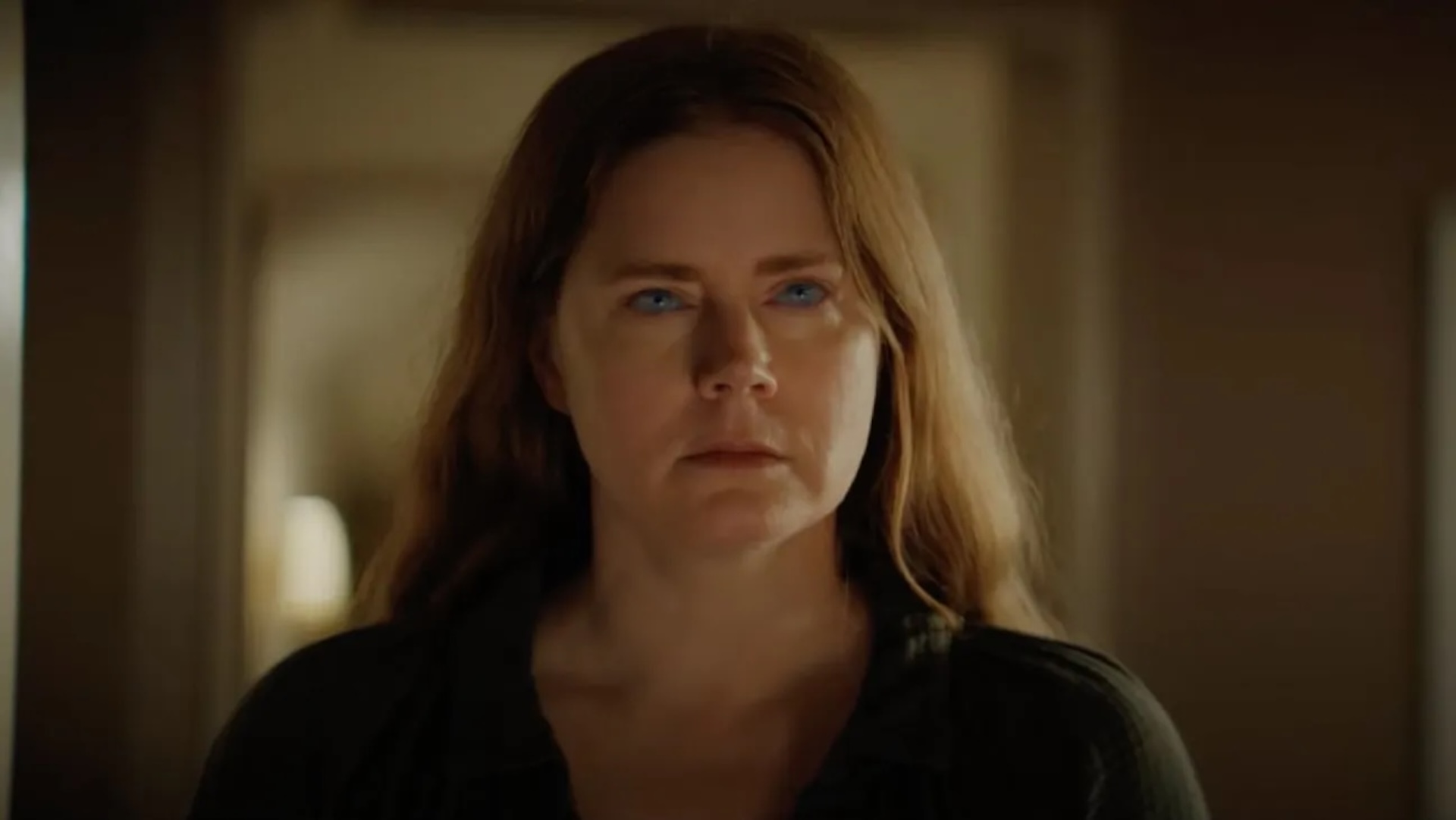Nightbitch is billed as a film about an overburdened stay-at-home mom who turns into a dog at night in order to free herself from her shackles. But it’s the night part rather than the bitch part that stands out here. This is a movie about a woman (Amy Adams) whose days have been stolen, who is pushed so far that the narrative has to contort into fantasy in order to break her out of her reality. This is her reality: Cast iron pan, sizzling butter, frozen hash brown, lunch with kid, walk with kid, library with kid, cast iron pan, sizzling butter, frozen hash brown, lunch with kid, walk with kid, library with kid. Time passes in blocks of repetition for this nameless mother who seems to exist only to complete the tasks that keep her child (not even herself) alive, one of countless Jeanne Dielmans pacing the planet, her identity absorbed by these mundane chores that mark the time ticking by and her life along with it. She seems barely there, even her epic earnest responses to outside questions about her life are only answered truthfully in her head, as she presents a frictionless surface. Or maybe not entirely frictionless. A slight grimace here, a pleading look there, something is starting to peek through the veneer.
This woman is so alone in this temporal hell that you are surprised when a man (Scoot McNairy) suddenly shows up. And this is the part of an otherwise generic-veering movie about the power of motherhood that stuck out in my mind. Because Nightbitch is the rare mainstream Hollywood movie that not only dissects a particular kind of passive male uselessness—in this case the father who is barely there and when he is there is barely there—but how that uselessness can actively prey on women’s time.
In one scene the mother is having her first shower in several days after another regular round of solo parenting and her husband keeps banging on the shower door to say they are out of milk. Rather than simply going out to buy it, perhaps the rare time he will have to do so considering he is so often out of town, the man’s brain tells him that he should spend his time instead interrupting his wife’s rare moment alone to ask why she didn't think to do it. At other moments, he languishes in his past-times—video games, spending an inordinate amount of time on the toilet—while the mother’s attempt at a nap here, a breather there, is perpetually invaded. It starts to become clear that the mother would, ironically, have more time were the father not there. That in fact his presence compounds the burden, the caretaking doubled. When she proposes a separation, he asks a question familiar to so many women—“Why didn’t you tell me?”—and the unspoken reply, as always, is, “Why should I have to?”
A lot has been written about women’s superhuman efficiency, about how much a life in which the social expectation for them to look after everyone often makes them able to work faster and better than men. Because they are forced to learn how. But it is still funny to see this mother having dinner with her artist friends, saying she hasn’t produced in years, and then, once she splits with her husband and has half her time to herself, conjuring a complete exhibition from scratch in no time. My favorite moment in the film is when her husband plaintively attempts to worm his way out of his alone time with their child, arguing that the child barely wants him around anyway. Here, the mother does not capitulate. Maybe that moment deserves its own Oscar.
I say that because Nightbitch only just premiered at the Toronto International Film Festival (where I saw it), and it is already being touted as the film that will get Adams her long-awaited Oscar. It’s a notable bookend to her first Oscar nomination for Junebug, which came almost two decades ago. In that film she played a naïve pregnant woman who thinks her baby will improve her marriage (“God loves you just the way you are, but he loves you too much to let you stay that way,” her character tells her useless husband). Nightbitch can be found at the end of that rainbow—one version of how life can go once the kid arrives. Maybe Adams will win an Oscar for this one; she’s great in it, though the film isn’t quite as good as she is. Based on the 2021 book by Rachel Yoder, in which the dog transformation truly acts as an outlet for a trapped woman, Marielle Heller’s film turns the conceit into a kind of accessory to the real story of a slowly depleting woman who ends up finding her maternal power, confronting her husband, and then—after he apologizes—having another baby. To me it played a bit neat.
But in an interview with Indiewire, Heller said she adapted Nightbitch when she was alone for months looking after her two kids for the first time while her husband was away for an extended period. Despite how isolated this made her feel, she saw having a baby as “the ultimate act of optimism and choosing hope.” She didn’t want to just present a man screwing up, she wanted to present that man admitting he screwed up and growing from it the way she saw her own husband grow. “I care about the genders understanding each other more than I care about tearing us apart,” she said. It reminds me of one of Adams’s character’s last lines in Junebug explaining why she wanted a child despite her husband’s eternal indifference: “I just wanted something good to come out of all this.”
Heller has expressed frustration at the claim that she gave the original story a “happier ending.” She argues that Yoder’s book is less dark than her film—there is no split, nor is there the same confrontation, and there is no second child to mark the couple's deliverance (so to speak). And there is the sense that a collective frustration is casting about for catharsis in books that critic Parul Sehgal summarizes as “marital crises of white women in their forties,” which more or less describes Yoder’s novel. Sehgal turned that phrase in her recent pan in The New Yorker of Sarah Manguso's Liars, a roman à clef about the dissolution of the author’s marriage, one in a long line of books in which being a wife rather than a mother seems to be the problem.
Sehgal describes Liars as a “balance sheet”—similar to Nightbitch, the wife is basically splitting the atom in the time it takes her husband to shit—in which terms like “abuse” are “deployed to foreclose thought.” The difference in Heller’s film is that the balance sheet seems designed less to extinguish the man than to revive the woman. Newly awakened to her own power as a mother, Adams’s character confronts her husband, a confrontation in which his crises emerge as well (no matter how inferior). Because of this—because the mother is placed within a reality in which the man also has a voice—it feels a little more convincing, less like the fairytale of a queen who has stumbled into a kingdom (into, as Sehgal puts it, “a suffering that seems not merely inevitable but ordained”). But the understanding of gender Heller seems so keen on addressing in Nightbitch still tips one-sided. The woman gains much of the insight, the man gains very little, as though her insight is strong enough to encompass his (once again the woman doing all the work). Heller does not fall into the trap of trading one lie for another—she is more inquisitive than that—but Nightbitch is still a little quick to let everyone off the hook.






